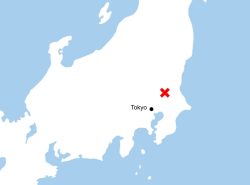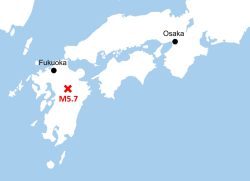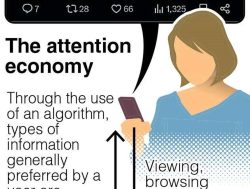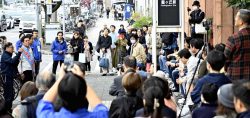Unbalanced Information Diet: Protecting the Facts / Disinformation on Japan’s Noto Quake Spread for Ad Revenue

A man looks at his post on X in Lahore, Pakistan, in March. The photo has been partially obscured.
The Yomiuri Shimbun
6:00 JST, April 23, 2024
Since the Noto Peninsula Earthquake on Jan. 1, at least 10 foreign countries have become major sources of false information about the disaster, as social media users there are motivated by the chance to gain impressions and generate revenue. This is the first installment in a series examining various situations in which conventional laws and ethics can no longer be relied on in the digital world, and exploring possible solutions.
***
SARGODHA, Pakistan – A resident of Sargodha, Pakistan, thought something terrible was happening in Japan when he found the words “Japan” and “earthquake” in his native language and video footage of boats and cars being swallowed up by black water and mud when he was browsing X, formerly Twitter, on his smartphone on Jan. 1.
The 39-year-old man was struck with the number of views on posts featuring the video. Some of them had amassed hundreds of thousands of impressions.
Thinking it was a “chance to make money,” he immediately reposted the video on X. He also spread images of collapsed houses and landslides he found on the internet. Whether they were really related to the Noto earthquake or not was not his concern.
Japan ‘2nd largest X market’
The man worked as a civil servant for 18 years after graduating from university. He lives in a brick house with about 10 of his relatives. Although he was financially stable, he needed to earn more for his eldest son, 16, who aspires to become a doctor.
He quit his job in October 2023 to start a new business to make a fortune.
That was around the time he read an article in which Elon Musk, the owner of X Corp., said people now can earn a living on X.
X began distributing ad revenue in summer 2023 to X users whose accounts have at least 500 followers and posts made in the past three months have been viewed more than 5 million times.
The man soon opened an X account and began dedicating six to seven hours a day to posting.
Initially, the number of views on his posts showed little growth. However, when he started making Noto quake-related posts, utilizing machine translation, he soon accumulated 3.6 million views.
More than 40 million people are estimated to use X each day in Japan. “I started making more posts with Japan in mind after learning from a friend that Japan is the world’s second-largest X market,” he said. Eventually, he was eligible to receive revenue from X.
On Feb. 1, one month after the quake, he was paid by X for the first time. Since X’s payment system was not available in Pakistan, he had the money transferred to a bank account in another country.
His first payment was $37. The average annual income in Pakistan is about $1,600. “I thought ‘I want more,’” he said.
Asked whether he was aware that the video of black water and mud he spread was taken during the 2011 Great East Japan Earthquake, he said, “I don’t know anything about that. I just wanted impressions.”
“I’m sorry for what I did to Japan. But I want to continue posting on X to make money,” he said.
‘Impression farming’
Changes to how X operates have led to an increase in the number of so-called impression farming posts. The for-profit practice disregards the accuracy of information and is behind the large-scale production of false information.
The Yomiuri Shimbun examined 108 of the accounts that had posted false information about the Noto earthquake on X.
Thirteen countries were listed as the residence of holders of 63 of the accounts, and 70% of those posts were from users from just five developing countries, including Pakistan, Nigeria and Bangladesh. Fictitious rescue requests and posts by those impersonating as quake victims were also confirmed.
“For the poor in developing countries, earnings on X can be enough to feed an entire family,” said Yuya Shibuya, an associate professor of social informatics at the University of Tokyo, who investigated disinformation related to the Noto quake. “Since it is easy to start social media accounts, people may have been motivated to earn impressions.”
The earthquake is said to be the first major disaster in Japan where a large amount of false information was spread from abroad. Serious action is needed as the adverse effects of the “attention economy,” where click-through rates are prioritized over the accuracy of information, are accelerating.
Popular Articles
Popular articles in the past 24 hours
-

Nagano Pref. Village to Introduce Fines for Some Disruptive Behav...
-

Santa Claus Delivers Christmas Presents to Penguins at Aquarium i...
-

M5.5 Earthquake Hits Japan’s Aomori and Iwate Prefectures; No Tsu...
-

Earthquake Damage Estimates Report Highlights Challenges Faced by...
-

Outline for Tax System Reform: Put Japan’s Economy on New Growth ...
-

Students Recreate 19th-Century Bento Boxes Made for Ino Tadataka'...
-

My Husband is Extraordinarily Strict with our Daughter, Who is St...
-

U.S. Plans to Stop Recommending Most Childhood Vaccines, Defer to...
Popular articles in the past week
-

Israeli Tourists Refused Accommodation at Hotel in Japan’s Nagano...
-

Tsukiji Market Urges Tourists to Avoid Visiting in Year-End
-

China to Impose Sanctions on Shigeru Iwasaki, Former Head of Japa...
-

U.S. Senate Resolution Backs Japan, Condemns China's Pressure
-

Japan to Support Central Asian Logistics Route That Bypasses Russ...
-

Speed Skater Yukino Yoshida Clinches Ticket to Milan
-

Kenta Maeda Joins Rakuten Eagles; Returns from American MLB to Ja...
-

Sharp Decline in Number of Chinese Tourists But Overall Number of...
Popular articles in the past month
-

Keidanren Chairman Yoshinobu Tsutsui Visits Kashiwazaki-Kariwa Nu...
-

Imports of Rare Earths from China Facing Delays, May Be Caused by...
-

University of Tokyo Professor Discusses Japanese Economic Securit...
-

Japan Pulls out of Vietnam Nuclear Project, Complicating Hanoi's ...
-

Govt Aims to Expand NISA Program Lineup, Abolish Age Restriction
-

Blanket Eel Trade Restrictions Rejected
-

Key Japan Labor Group to Seek Pay Scale Hike
-

M4.9 Earthquake Hits Tokyo, Neighboring Prefectures
"Society" POPULAR ARTICLE
-

M4.9 Earthquake Hits Tokyo, Neighboring Prefectures
-

M7.5 Earthquake Hits Northern Japan; Tsunami Waves Observed in Hokkaido, Aomori and Iwate Prefectures
-

Israeli Tourists Refused Accommodation at Hotel in Japan’s Nagano Pref., Prompting Protest by Israeli Embassy and Probe by Prefecture
-

Tsukiji Market Urges Tourists to Avoid Visiting in Year-End
-

M5.7 Earthquake Hits Japan’s Kumamoto Pref., Measuring Upper 5 Intensity, No Tsunami Expected
JN ACCESS RANKING
-

Keidanren Chairman Yoshinobu Tsutsui Visits Kashiwazaki-Kariwa Nuclear Power Plant; Inspects New Emergency Safety System
-

Imports of Rare Earths from China Facing Delays, May Be Caused by Deterioration of Japan-China Relations
-

University of Tokyo Professor Discusses Japanese Economic Security in Interview Ahead of Forum
-

Japan Pulls out of Vietnam Nuclear Project, Complicating Hanoi’s Power Plans
-

Govt Aims to Expand NISA Program Lineup, Abolish Age Restriction





